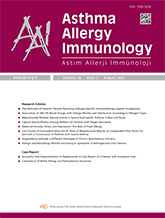


Objective: Chronic spontaneous urticaria (CSU) is characterized by urticarial plaques and/or deeply seated swellings (angioedema) persisting for more than 6 weeks. Angioedema accompanies approximately half of CSU patients, however data on the clinical significance of angioedema is sparse. In our study, we aimed to investigate whether CSU cases accompanied by angioedema (CSUwAE) differ from CSU cases without angioedema (CSUwoAE) in terms of clinical features, treatment responses and associated conditions.
Materials and Methods: We retrospectively examined the medical records of chronic urticaria patients who were referred to the Urticaria Center of Reference and Excellence of Okmeydani Training and Research Hospital between January 2013 and July 2019, and included CSU patients who had at least 3 months of follow up data and Urticaria Control Test (UCT) scores at the 0 and 12th weeks in the study. We obtained demographic, clinical and laboratory characteristics of the patients and the treatments they received from the patient files. We evaluated the effectiveness of treatment using UCT. We compared data between CSUwAE and CSUwoAE cases.
Results: A total of 556 CSU patients were included in the study. Of all, 57% was CSUwAE and 43% was CSUwoAE. More CSUwAE patients had a disease duration of more than 5 years (p=0.031); and emergency admission, non-steroidal anti-inflammatory drug intolerance, autologous serum skin test positivity, and increased C-reactive protein values were found more frequently in CSUwAE cases (p<0.001; p=0.011; p<0.001; p=0.009, respectively). The skin prick test positivity rate was higher in CSUwoAE cases (p=0.043). The overall remission rates were lower in CSUwAE (p=0.009). Resistance to both standard doses of antihistamines and need for third-line treatments were more frequent in CSUwAE (p=0.004; p=0.009, respectively).
Conclusion: Angioedema is a feature of antihistamine refractory, severe CSU with longer disease duration and might be an indicator of autoimmune CSU.